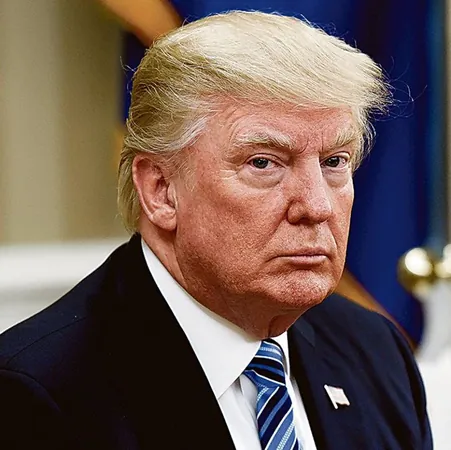
What Canada Must Consider from Trump's 2024 Presidential Campaign: A Wake-Up Call for Diplomacy?
2024-12-27
Author: Michael
WASHINGTON –
Donald Trump emerged triumphant, shocking the political landscape of America as he reclaimed the presidency in a stunning comeback. This unexpected victory underscored a growing trend toward isolationism, protectionism, and an aggressive stance on tariffs, creating ripples of concern across the border in Canada.
In his victory speech delivered on November 6 in Florida, Trump jubilantly declared, “We overcame obstacles that nobody thought possible, and it is now clear that we've achieved the most incredible political thing. Look what happened, is this crazy?” His statements not only reflected his surprise but also set the tone for the potentially tumultuous relations with Canada.
Fresh off his victory, Trump wasted no time in introducing his brand of “Twitter diplomacy,” issuing ominous threats to impose 25 percent tariffs on key trading partners like Canada and Mexico. Christopher Sands, director of the Canada Institute at the Woodrow Wilson Center, remarked, "That sense that Canada was a special friend and therefore was protected, I think is dead." The fallout from Trump's presidency has created a precarious environment where Canada can no longer rely on its historical 'special relationship' with the U.S.
Adding to the diplomatic complexity, political drama at home saw Chrystia Freeland's unexpected resignation as finance minister lead to speculation regarding Prime Minister Justin Trudeau's future. As millions readied for what might be another tumultuous next few years, analysts suggest Canada must adopt new strategies to navigate an increasingly unpredictable neighbor.
Experts have identified critical lessons for Canada from Trump's tumultuous 2024 campaign. The road leading to the presidential election was fraught with dissatisfaction from a populous tired of the political status quo. The June presidential debate unmasked concerns over President Joe Biden’s age and competence, leading many to view the incumbent as vulnerable.
A particularly jarring moment for the Biden campaign was an assassination attempt on Trump during a rally in Pennsylvania, which paradoxically strengthened Trump’s image of resilience against a backdrop of a struggling Biden administration. Such moments created a marked contrast and solidified Trump’s appeal to American voters who felt disconnected and disillusioned.
In stark contrast, Kamala Harris, who succeeded Biden after his withdrawal, struggled to resonate with voters outside the Democratic base, failing to address pressing economic concerns during her campaign.
Trump’s narrative capitalized on fears regarding the economy and immigration while promising significant cuts to federal spending alongside an isolationist agenda focused on tariffs and withdrawal from international agreements. In his victory speech, Trump vowed to adhere to the mantra: "Promises made, promises kept," a phrase that encapsulated voter sentiment craving change.
Alasdair Roberts, a public policy professor at the University of Massachusetts Amherst, posits that the U.S. is amid a paradigm shift in governance reminiscent of the changes seen during Franklin D. Roosevelt's era and the Reagan administration. This transformation reflects a long-standing dissatisfaction with traditional policies, amplified by frustrations stemming from the global financial crisis dating back to 2007.
As Canada looks to navigate these turbulent waters, experts suggest a reconsideration of its diplomatic approach. Roberts warned that depending on a stable and predictable relationship with the U.S. could spell disaster for Canada’s future. “We need to get our act together,” he stated emphatically, advocating for a more proactive and resilient approach to diplomacy.
Canada must ramp up its efforts to reinforce its value as an essential trading partner, particularly in sectors like critical minerals. Although Canadian officials have voiced their intent to be key players in this field, failure to deliver tangible results could see the U.S. turning its attention elsewhere.
With significant political shake-ups on the horizon, such as potential changes in leadership ahead of the 2025 Canadian election, the time to act is now. Canada must not only protect its interests but actively demonstrate its relevance on the global stage, especially as discussions around artificial intelligence regulation and strategic partnerships in the Indo-Pacific gain momentum.
As the political landscape continues to evolve, Canada faces a crucial opportunity to reshape its diplomatic strategy in light of Trump's victory, ensuring it remains a key player in an unpredictable future. The stakes are undeniably high.









 Brasil (PT)
Brasil (PT)
 Canada (EN)
Canada (EN)
 Chile (ES)
Chile (ES)
 España (ES)
España (ES)
 France (FR)
France (FR)
 Hong Kong (EN)
Hong Kong (EN)
 Italia (IT)
Italia (IT)
 日本 (JA)
日本 (JA)
 Magyarország (HU)
Magyarország (HU)
 Norge (NO)
Norge (NO)
 Polska (PL)
Polska (PL)
 Schweiz (DE)
Schweiz (DE)
 Singapore (EN)
Singapore (EN)
 Sverige (SV)
Sverige (SV)
 Suomi (FI)
Suomi (FI)
 Türkiye (TR)
Türkiye (TR)